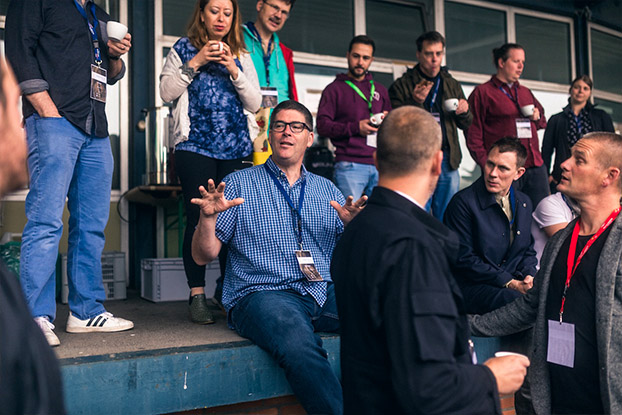
Gut instincts and judgment calls are among the most valuable pieces of knowledge. Typically, that is developed over years, or decades, of work in a focused area, such as education, healthcare, law enforcement or finance.
Bottling that information through artificial intelligence in a way that can be translated by scale using a pioneering piece of technology was recently outlined in a talk at Goizueta. Karl Kuhnert, a professor in the Practice of Organization & Management, engineered the discussion by Carl Wocke, managing director of Merlynn Intelligence Technologies, a South Africa-based company.
Wocke introduced to an audience of industry professionals, professors and students proprietary technology called “TOM,” or Tacit Object Modeler, something that is built to replicate and clone human expertise. The idea, by working with companies around the world, is to digitally produce the information that leads a police officer to make a traffic stop, a doctor to believe something deeper is wrong, or a customs and border agent to question a suspicious cargo ship. Mimicking human expertise instead of replacing it.
“What this technology does is it actually digitizes the wisdom of experts,” Kuhnert said. “That is, taking the long history of how that expert makes a decision and digitizes it and creates an algorithm. The real genius for this technology for me is the ability to scale expertise, because you can share this algorithm with others and help them grow and develop.”
Wocke said he’s driven by a fusion of psychology and mathematics, and that the most important issue facing us is access to knowledge.
“I became obsessed with the concept of what happens when someone dies,” Wocke said. “What happens with knowledge? How can you lose knowledge, how can you lose experience? How can you lose expertise? How can you lose who you are? Where does that go?”
Wocke believes expertise is worth something. For example, someone experiencing chest pains would put added value in a top cardiologist.
“There’s comfort, there’s value in actually getting the bias of an expert to assist you with that decision,” he said. “Time and time again, we see that. When the rubber hits the road, when the back’s against the wall, people reach out for that expertise. So, with the TOM technology, we have the ability to reach out for that expertise and touch that expertise.”
One romantic notion Wocke describes is if someone is facing a life-altering decision, they could go to their great-grandfather and ask him, “What would you do?” That kind of advice is human, he said. Google might return an aggregate, but imagine asking the likes of Abraham Lincoln or Nelson Mandela? Wocke and Kuhnert believe there is a significant industry around second opinions in the medical space.
Wocke believes there are three phases of AI: making it credible; commercializing intellectual property of an asset that’s developed; and using technology to give back to society, and encapsulating expertise where it’s available commercially. The key is not only accessing expertise, but also making it available.
The importance of TOM is not only found in business, Kuhnert said, “but I actually think it has a great deal of importance how we make better decisions in general.”











